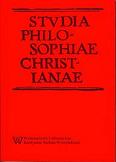Sumienie a praktyczna racjonalność. Jak pogodzić tradycyjne ujęcie sumienia z roszczeniami do nieskrępowanej wolności?
Conscience and practical rationality. How to reconcile the traditional concept of conscience with caims to unfettered freedom?
Author(s): Wojciech WierzejskiSubject(s): Philosophy, Ethics / Practical Philosophy
Published by: Wydawnictwo Naukowe Uniwersytetu Kardynała Stefana Wyszyńskiego w Warszawie
Keywords: conscience; freedom; practical rationality; John Paul II;Aquinas;
Summary/Abstract: We can observe a paradox. On the one hand we hear a lot about: freedom of conscience, prisoners of conscience, conflicts of conscience, conscience clauses. On the other hand conscience has been ignored, at least by philosophers. Another kind of paradox: conscience, which often in history became a staunch ally of all the fighting against lawlessness (i.e. against the evil written law, in defense of the natural law) and against the arbitrariness of tyrants (i.e. against those who apply "will to power"), today is presented as standing in opposition to the objective moral order, or as the reason justifying the choices of moral evil. The philosopher should ask: how did that happen? The paper addresses the issue of conscience. At the beginning it recalls the traditional (Thomistic) distinction: intentio, synderesis and conscientia. Conscience is entered into the scheme synthesizing the theory of practical reasoning (derived from Aristotle) with the concept of free will (Augustinian). The human soul encounters a peculiar tension between obedience to absolute and objective requirements of natural law and the propensity for independence based on the experience of the individual. Veritatis Splendor helps to explain these two types of paradoxes.
Journal: Studia Philosophiae Christianae
- Issue Year: 51/2015
- Issue No: 3
- Page Range: 67-82
- Page Count: 16
- Language: Polish

